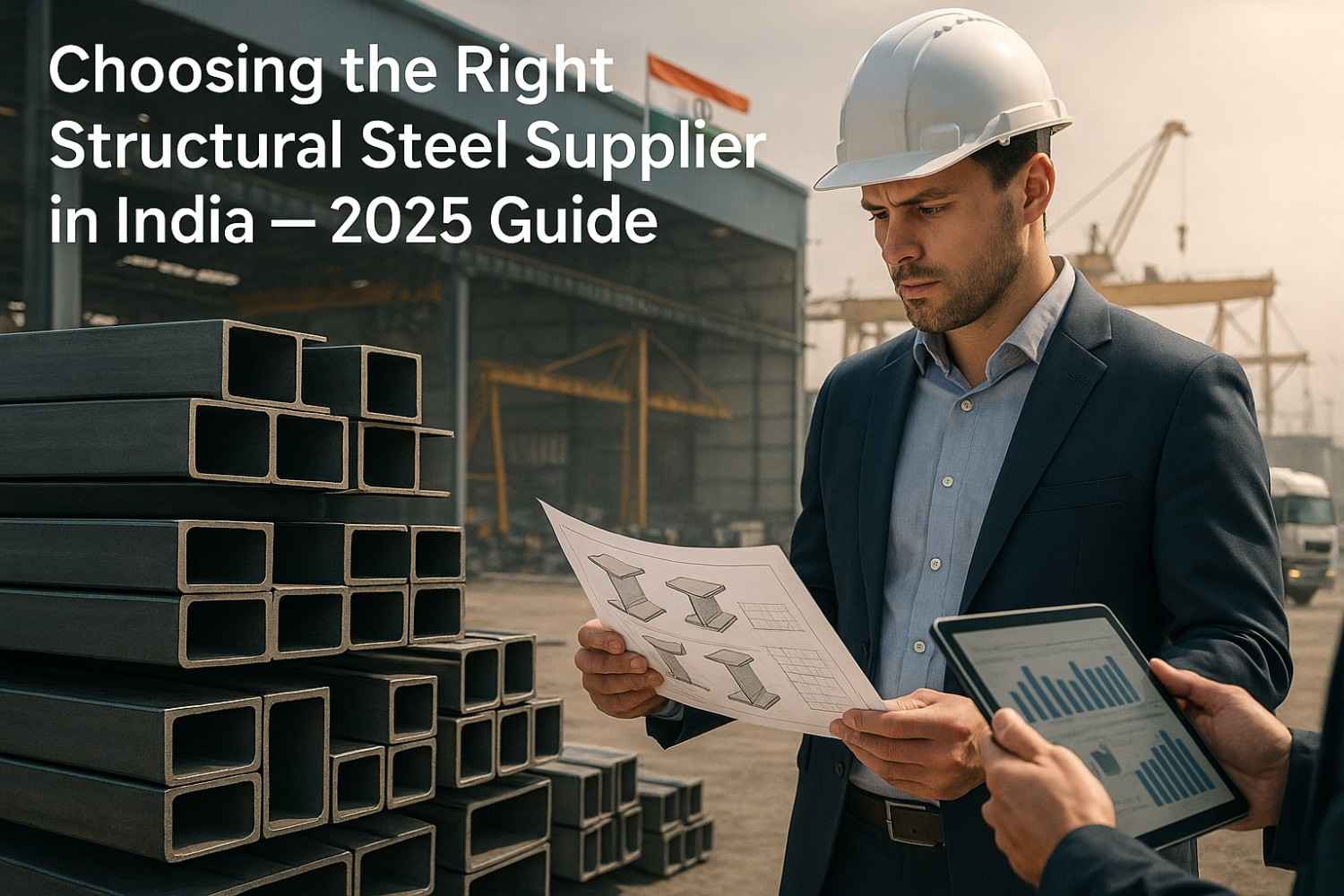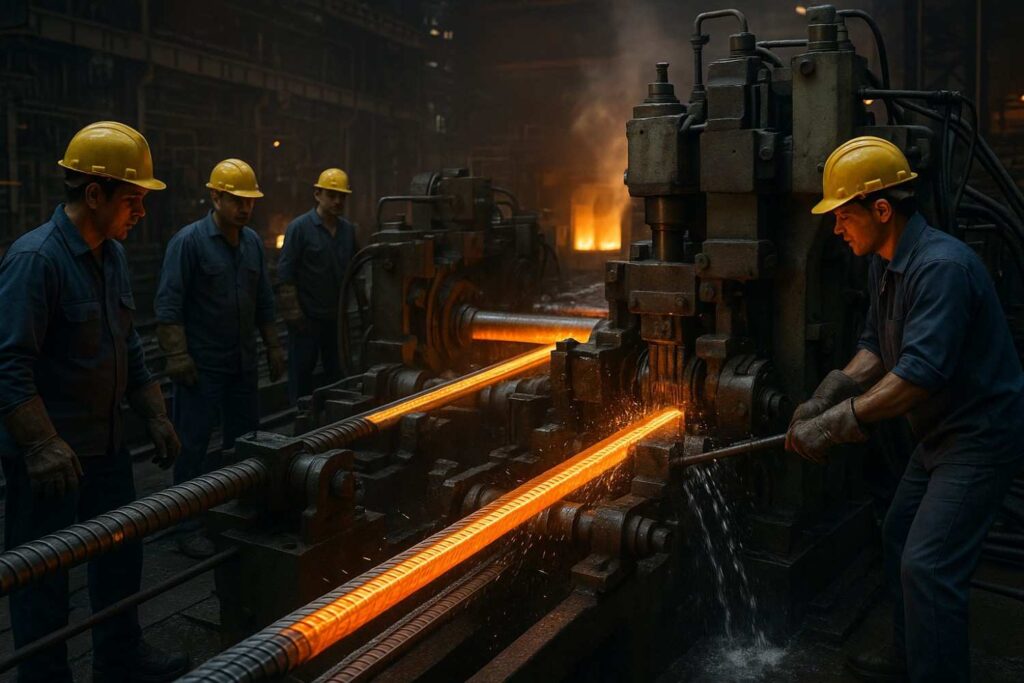
Introduction: India’s Steel Crossroads & What It Means for Your Supplier Choice
In 2025, structural steel procurement in India has become a high-stakes equation. Domestic policy reforms, shifting global trade pressures, and evolving infrastructure demand are making supplier selection more critical than ever.
India’s finished steel consumption is estimated to grow by 9–10% in FY25, driven by robust infrastructure, urbanization, and government spending. India Brand Equity Foundation Yet, India recently turned into a net importer of finished steel in September 2025, importing 0.65 million metric tonnes while exports were 0.58 million tonnes. Reuters
With such dynamics, choosing a structural steel supplier isn’t just about price — it’s about resilience, compliance, delivery reliability, and alignment with national goals.
As someone who has overseen procurement and supplier management in large infrastructure projects, I’ve seen how the wrong supplier choice can lead to delays, cost overruns, and structural risk. This guide walks you through critical, data-backed factors to vet steel suppliers in 2025, especially under the new policy regime.
Note: This article references real government policy updates and industry data as of mid-2025. Always cross-check with the latest sources, and consult your structural engineer before finalizing contracts.
Why Supplier Choice Has Become More Complex in 2025
Policy Shifts Favoring Domestic Steel
In April 2025, India tightened steel procurement rules to favor domestic manufacturers — global tenders are restricted for iron & steel procurement in government contracts.
On July 25, 2025, the Ministry of Steel amended its Domestically Manufactured Iron & Steel Products (DMI&SP) policy. That mandates that for many central government projects, iron and steel must be fully manufactured in India (“melt and pour” rule). ETManufacturing.in
Further, India has announced temporary safeguard duties (e.g., 12%) on certain steel products to curb imports and protect domestic mills.
These moves increase the pressure on suppliers to be truly “Indian,” fully compliant, and equipped with local capacity and traceability.
Global Trade & Capacity Pressures
Globally, steel capacity is projected to expand by ~6.7% over 2025–2027, especially in Asia. OECD
The EU’s recent proposal to halve tariff-free steel import quotas (aimed at protecting its domestic industry) could lead to redirected steel flows affecting Indian markets. AP News
Although India exports little to the U.S., global tariff realignments create ripple effects across commodity pricing and raw material flows.
Given this complex backdrop, your chosen supplier must be adaptable, policy-aligned, and financially robust.

Key Factors to Vet in a Structural Steel Supplier
Below is a deep dive into what matters most — with red flags and best-in-class traits to watch for.
Certification & Quality Assurance
BIS / IS 1786 compliance is non-negotiable for TMT and structural steel products.
Insist on Mill Test Certificates (MTCs), especially for structural beams, hollow sections, and rebars (Fe 500 / Fe 550 / Fe 500D / Fe 550D).
Ask for traceability documentation — chain-of-custody, manufacturing plant, heat numbers.
Prefer suppliers with ISO 9001 / ISO 14001 / ISO 45001 certifications.
Red Flag: Suppliers who cannot send sample chemical / mechanical test reports for batches.
Manufacturing & Processing Capacity
A reliable supplier must have adequate production capacity and redundancy to absorb demand shocks (e.g. power outages, material shortages).
Capabilities beyond basic rolling — e.g. advanced processing, cutting, fabrication, preassembly — add value.
Plants located close to raw materials and connectivity (rail/port) reduce logistics disruptions.
Financial & Operational Stability
Review financial statements: strong cash flow, manageable debt, and stable margins.
Check if the supplier is exempt from new import rules — some foreign integrated steel plants with existing BIS certifications got exemptions. Argus Media
Evaluate their order backlog, delivery records, project references in past 2–3 years.
Logistics & Supply Chain Resilience
Factor proximity: regional warehouses or offshoot storage can reduce delays.
Multiple transport modes (road + rail + port) for fallback options.
Inventory planning and buffer stock — suppliers who offer to hold project stock can mitigate delays.
Innovation, EHS & ESG Practices
Environmental, Health & Safety (EHS) practices matter. Clean air compliance, energy efficiency, green steel adoption.
Some government projects may require steel from green-rated mills — a trend toward mandating green steel by FY27-28 is surfacing.
Look for suppliers adopting low-carbon steel, use of scrap recycling, or renewable energy usage.
Contracting & Commercial Terms
Payment terms with partial advance & milestone payments.
Penalties or SLA clauses for delayed delivery or quality failures.
Price escalation formula based on reference indices (e.g. steel futures/indices).
Warranty or replacement clauses for defects.
How to Shortlist & Select — Step-by-Step Guide
Create a Request for Proposal (RFP) Template
Include technical specs, quality standards, delivery schedules, testing requirements, penalties.Pre-Qualification Screening
From RFP respondents, discard suppliers that don’t meet certifications or policy compliance (e.g. DMI&SP).Technical Audit / Plant Visits
Inspect rolling, quenching, processing, testing infrastructure. Verify lab, QA practices.Sample & Test Orders
Place small batch orders to test consistency, delivery and quality before full-scale deals.Negotiate Flexible Contracts
Include buffer quantities, future orders, and steel price hedging clauses.Ongoing Performance Monitoring
Use KPIs (on-time delivery, rejection rate, logistics delays) & periodic audits.
Frequently Asked Questions on Choosing the Right Structural Steel Supplier in India
Check for BIS certification, delivery timelines, product range, and after-sales support. Trusted suppliers like APL Apollo SG TMT ensure consistent quality, strong logistics, and on-site assistance for construction professionals.
Recent trade sanctions and import-export duties have increased price volatility in the Indian steel sector. Domestic suppliers mitigate this by maintaining strong manufacturing capacity and sufficient inventory to balance market fluctuations.
Suppliers should comply with BIS IS 2062 standards for structural steel and provide Mill Test Certificates (MTCs) to ensure authenticity and traceability.
Domestic suppliers like APL Apollo SG TMT offer faster supply, better price stability, and verified quality assurance compared to fluctuating international markets.
Contractors can check bar markings, request MTC certificates, and perform on-site inspections to confirm compliance with BIS norms before purchasing.
Case Study — How Supplier Choice Made or Broke a Project
In 2024–25, a highway contractor in Maharashtra avoided a ~15% cost overrun by picking a domestic supplier compliant with DMI&SP policy and buffer stock clause. When import surges threatened raw material cost escalations, the supplier held advanced orders as promised, avoiding disruption.
Contrast that with a poorly vetted supplier in Eastern India: delayed deliveries, grade mismatches, and failed onboarding caused stoppages and penalties.
This real-world contrast underscores the value of disciplined supplier selection under volatile markets.
Interlinking Notes & Internal References
-
For deeper context on pricing, see: TMT Bar Price Trends 2025: Common Buying Mistakes & Global Policy Effects
-
For volume & demand projection methods: Beginner’s Guide to Calculating TMT Bar Quantity
-
If you’re considering procurement mistakes to avoid, check: TMT Bar Price Guide: Mistakes to Avoid
Conclusion
Selecting a structural steel supplier in India in 2025 is not just about price — it’s a strategic decision impacted by shifting global trade, domestic policy, capacity, quality, and resilience. As India’s imports swell, and government procurement policy tightens in favor of domestic mills, your supplier must be future-ready and aligned with policy.
Want a reliable partner? Explore APL Apollo TMT Bars for residential and commercial use, and APL Apollo SG INFRA (Fe 500D / Fe 550D) for infrastructure-scale, policy-compliant projects.

APL Apollo TMT
Phone: 9266157778
Website: aplapollosgtmt.com




Pingback: India’s Steel Market 2025: PLI Scheme, Import Curbs & TMT Bar Price Outlook